2004 Toyota Prius Repair, Service & Tires
Get Started
Complete Auto Care for Your 2004 Toyota Prius
-
TIRES FOR YOUR 2004 Toyota Prius View Tire Info GET TIRE PRICING
-
REPAIR FOR YOUR 2004 Toyota Prius View Repair Info SCHEDULE REPAIR
-
MAINTENANCE FOR YOUR 2004 Toyota Prius View Maintenance Info SCHEDULE MAINTENANCE
-
OFFERS FOR YOUR 2004 Toyota Prius Limited Time Tire Offers VIEW ALL COUPONS
2004 Toyota Prius Tires
Recommended Tires | Tire Information
2004 Toyota Prius Tires Sizes, Speed Ratings, and Inflation
Not sure about your 2004 Toyota Prius tire size? Use the following chart to find information on tire size, speed rating, and inflation.
| Trim Level | Speed Rating | Inflation in PSI F/R | Tire Size |
|---|---|---|---|
| 2004 Toyota Prius Base* | S | 35 PSI/33 PSI | P185/65R15 |
| 2004 Toyota Prius Base* | S | 35 PSI/33 PSI | P185/65R15 |
|
2004 Toyota Prius Base* Speed Rating: S Inflation F/R: 35 PSI/33 PSI |
|
2004 Toyota Prius Base* Speed Rating: S Inflation F/R: 35 PSI/33 PSI |
* Note: these models have different tire sizes depending on vehicle options.
Recommended Tires for Your 2004 Toyota Prius
What tires are best for a 2004 Toyota Prius? Check out the following tire brands and types.
 Blizzak WS90
Blizzak WS90
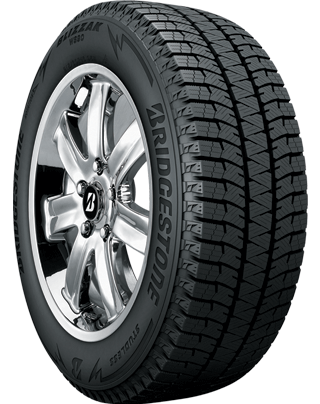
- No warranty
- Winter
- Winter
 Ecopia EP422
Ecopia EP422
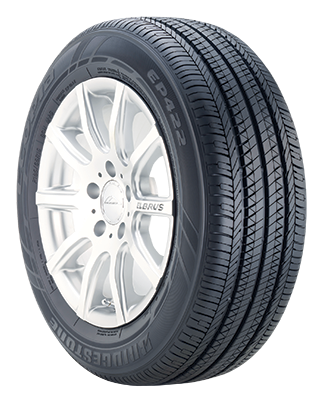
- Platinum Pact Limited Warranty
- All-Season
- Performance
 Ecopia EP422 Plus
Ecopia EP422 Plus
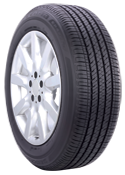
- Platinum Pact Limited Warranty
- All-Season
- Performance
 WEATHERPEAK
WEATHERPEAK
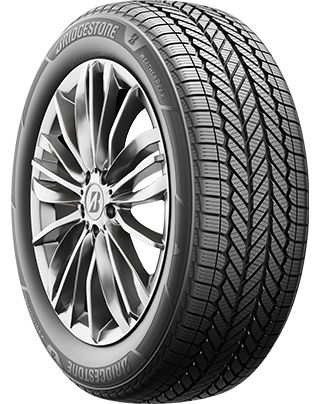
- Platinum Pact Limited Warranty
- All-Season
- Passenger Tires
 ALL SEASON
ALL SEASON

- No warranty
- All-Season
- Passenger Tires
 WEATHERGRIP
WEATHERGRIP
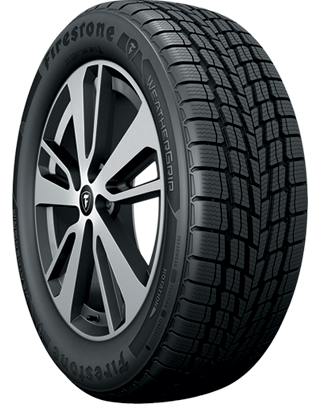
- No warranty
- All-Season
- Passenger Tires
 Winterforce 2
Winterforce 2
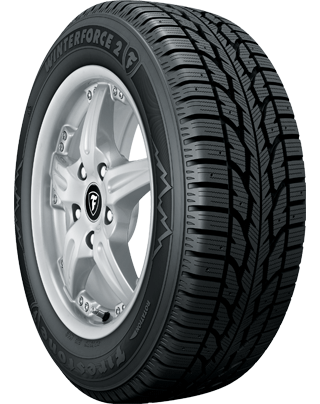
- No warranty
- Winter
- Winter

- No warranty
- All-Season
- Passenger Tires

- No warranty
- All-Season
- Passenger Tires
 Extensa A/S II
Extensa A/S II

- No warranty
- All-Season
- Passenger Tires
Choosing 2004 Toyota Prius Tires
Apart from finding the right tire size, there are a couple of other factors to consider when buying Toyota Prius tires like where and how you drive, and what tire brand you trust most. When evaluating your driving conditions, think about where you live (countryside vs. city vs. mountains) and the kind of unexpected weather you're likely to experience. Drivers in states that fully experience all four seasons often buy two sets of tires: one set for winter, one set for summer. Other drivers prefer the convenience of all-season tires. They make one trip to the tire shop and they're pretty much ready for rain, light snow, or sun!
Your personal driving style is the next factor to consider. If you're a diehard off-roader, you have very different tire needs than a highway commuter who doesn't leave the paved path. Talk to a tire technician at Firestone Complete Auto Care for help choosing the best tire for you, or start shopping for Toyota Prius tires online.
2004 Toyota Prius Tire Installation & Rotation
Firestone Complete Auto Care installs more tires on more cars than most other companies. We're a tire store that also offers professional tire installation, maintenance, and rotation, along with complete auto care. Buy 2004 Toyota Prius tires online and schedule your installation when it's convenient for you.
2004 Toyota Prius Tire Questions
-
Why does Toyota tire inflation matter? Even a tiny decrease in tire pressure could impact your safety and fuel economy. Maintaining proper tire pressure can help increase fuel economy, improve braking time, and boost tire lifespan.
-
Why are there numbers on the side of my Toyota Prius tires? Your tire sidewall numbers tell you the recommended load carrying capacity, speed rating, treadwear, traction, and tire size. Talk to a tire technician to learn how to read Toyota tire numbers.
-
Is there an easy way to check Toyota tire tread depth? Stay on top of your tire tread depth to help avoid a dangerous drive. You can check tread depth with a penny. Hold the penny so that Abraham Lincoln is facing you, then place your penny into a tread groove upside down. If you can see the top of Abe’s head, your tread is shallow and it might be time for new Toyota Prius tires. Grab a penny. Hold the so that Abe Lincon's head is facing you and his hair is pointing toward the ground. Then, place the penny into a tread groove. If you can see the top of Abe’s head, your tread is shallow and it might be time for new Toyota Prius tires.
2004 Toyota Prius Repair
When to repair, when to replace? Click on a repair below to learn more about Toyota Prius repairs at Firestone Complete Auto Care.
About 2004 Toyota Prius Repairs
No driver looks forward to car repairs. We’re here to change that, though. At Firestone Complete Auto Care, we want to make car repair painless and hassle-free. When you come to us for 2004 Toyota Prius repair services, rest easy knowing that your Prius is in capable hands. We'll work to evaluate the scope of repairs needed and explain your options. We’ll never recommend a repair we don’t think is necessary for your safety or the performance of your Toyota.
How Much Does Toyota Prius Repair Cost?
The cost to repair your 2004 Toyota Prius depends on which repairs are needed, the cost of any replacement parts, the amount of labor necessary to get the job done, and your locale. They're updated regularly!
A few different aspects can influence repair costs for your 2004 Toyota Prius, like
2004 Toyota Prius Auto Repair Q&A
-
Can scheduled maintenance help me avoid repairs? The cheapest 2004 Toyota Prius repair is the one that isn’t necessary in the first place! Staying up-to-date with your car’s scheduled maintenance services is a great way to keep future repair costs low.
-
What does it mean to be 'in tune' with your car? You’re in your car, day in and day out. So, it’s only expected that you know your car better than anyone else! If you notice mysterious smells, strange engine noises, or other out-of-the-ordinary symptoms while driving, trust your instincts and stop into Firestone Complete Auto Care for a Courtesy Check. Catching a potential issue early could help prevent Toyota Prius repairs.
-
Why do you recommend certain repairs for my Toyota? We won’t recommend a service or repair for your 2004 Toyota Prius unless we think it’s necessary to keep you safe. Want to know more about a specific recommended repair? Ask! We’re here to help.
Get Your 2004 Toyota Prius Brakes Fixed
Your Toyota Prius may be powered by a strong engine. But if you can't stop it, then it's scrap metal. Don't wait if you're experiencing brake squeaks or a loss of braking power. Unresponsive brakes make it tough to give the road your best. Plus, ignoring your brake problems can result in more damage and higher brake repair bills. Get your 2004 Toyota Prius brakes fixed at Firestone Complete Auto Care. Our brake repair services include pad/shoe replacement, brake rotor/drum refinishing, brake fluid exchange, and brake caliper and wheel cylinder installation.
Answers to Your Prius Brakes Questions
-
What can cause my Prius to shake when I apply the brakes? If your Prius shakes when you brake, you could be dealing with warped rotors, faulty brake calipers, worn brake pads or rotors, or loose or worn suspension parts. Schedule a free brake inspection at Firestone Complete Auto Care for help diagnosing your brake issue.
-
How long should my Prius brake pads last? You can usually get around 30,000 to 40,000 miles out of your brake pads, but how and where you drive your Prius can affect this. Hauling large loads or riding your brakes can shorten their lifespan, while smoothly braking and mostly sticking to highways can help your brake pads last longer.
-
Does brake fluid leak when the car is off? Because your Prius brake system is a closed hydraulic system, it should not leak brake fluid. However, if components in your brake system have worn out or been damaged, it might cause brake fluid to leak.
When to Get Toyota Prius Drivetrain Repairs
Drivetrains for front, rear, and all-wheel-drive and 4WD vehicles are not all the same. You don't want to go to any random shop for drivetrain repair. You want to go to Firestone Complete Auto Care. We can take care of most 2004 Toyota Prius drivetrain components Your Toyota could be crying out for driveshaft repair if you notice vibration as your vehicle accelerates, clunks when shifting, heavy vibrations in your floorboards, or resistance when turning.
Questions About 2004 Toyota Prius
-
How do I know if my Toyota drivetrain is damaged? Hear noises toward the back of your Toyota Prius? See fluid leaking? Having issues turning? These could all be signs of drivetrain damage you don't want to ignore. Take action quickly to catch repairs or replacements before something more severe happens.
-
What causes a Prius’s malfunction indicator light (MIL) to illuminate? The malfunction indicator light — also known as the check engine light — on your Prius can illuminate for a variety of reasons, including engine issues, electrical problems, damaged sensors, transmission problems, misfires, and faulty connections.
-
How worried should I be about a drivetrain malfunction in my Prius? If you experience a drivetrain malfunction in your Prius, it is important to have it inspected by a professional mechanic as soon as possible to identify the underlying cause and perform the necessary repairs. Driving with a malfunctioning drivetrain can be dangerous and cause further damage to your car.
Wheel Alignment for 2004 Toyota Prius
Alignment services involve precise adjustments to your Toyota Prius’s suspension system, the connection between the vehicle and the wheels. During the service, calculated changes are made to the angles of your tires. This is so that your tires hit the road at an optimal angle for your vehicle’s performance — just as Toyota intended. Before we adjust the alignment of your 2004 Toyota Prius, we’ll start by checking the current alignment angles. If needed, we'll adjust your wheel alignment angles to match Toyota recommendations.
Answers to Toyota Prius Alignment Questions
-
What can knock my Toyota Prius out of alignment? Potholes and uneven roads can knock your car out of alignment, so stay aware of the road ahead and adjust your speed (or avoid these obstacles whenever it’s safely possible).
-
How frequently should you get a wheel alignment for your Prius? It’s usually suggested you check your alignment about every 6,000 miles or 6 months (whichever occurs first). Still, you should reference your Prius owner’s manual for Toyota's recommended interval.
-
Do you need to get your Prius wheels aligned when you get new tires? While you don’t necessarily need to get an alignment when putting new tires on your Prius, it’s still a good idea. Ensuring your wheels are properly aligned can help support optimal handling, tire wear, and fuel efficiency.
Engine Repairs for Your 2004 Toyota Prius
When your Toyota Prius engine needs repairs, our technicians will provide you with a thorough explanation beforehand. We never do any work without your sign-off. If a repair can wait, we'll let you know. We'll also tell you if it's necessary for your safety. We seek to give you all the info you need to make a smart decision about our services. Turn to Firestone Complete Auto Care for your 2004 Prius engine repairs and you can feel good knowing that we only use Toyota-compliant replacement parts such as the serpentine belt, oil gasket, sensors, or a different component.
Engine Q&A 2004 Toyota Prius
-
Why does the check engine light come on when I start my Prius? It’s usually normal for your check engine light to turn on upon ignition. This is just your Prius testing its circuits. The dash light shouldn't stay on. If it does, you might want to bring your vehicle in for service.
-
Why does my Toyota engine sound different? Unusual noises can signal a problem with your Toyota Prius engine. Tapping or knocking could mean you're low on oil. Whistling could mean a belt is misaligned or there's an intake leak. Squealing can indicate a loose fan belt, and grinding might be coming from the brakes, not the engine.
-
What could damage a Toyota engine? Certain driving habits can hurt your engine. These habits include driving on an empty fuel tank, revving your engine while the vehicle is in Park, or slamming the gas pedal while the engine is still cold. Steer clear of these habits to help protect engine performance and efficiency.
Tire Repair for Your 2004 Toyota Prius
If your 2004 Toyota Prius is in need of a tire inspection or possible flat tire repair, Firestone Complete Auto Care has your back. There’s a chance your tire could be plugged and patched (rather than replaced). Our technicians can inspect your tire and let you know if it is safe to repair. We’ll begin by taking a look at where the damage is, the type and extent of the tire damage, and how all of your tires are wearing.
If we determine that your 2004 Toyota Prius tire can be safely repaired, we’ll get to work on the steps to fix it: (1) Separate the tire from the vehicle wheel, (2) fill in the area that’s been punctured to prevent damage from moisture, and (3) secure and seal the inner tire liner to ensure the tire is airtight.
Toyota Prius Tire Repair Questions
-
What happens if I drive my Toyota on a flat tire? Driving on a flat tire is not a good idea. Your Prius engine will keep running with a flat tire, but you could damage your wheel by continuing to drive on a flat.
-
Is temporary sealant bad for my Toyota's tires? A temporary sealant may be able to help you get to a repair location safely. But temporary or emergency sealants could possibly damage TPMS sensors, and in some cases may even void the warranty on your Bridgestone or Firestone tires. If your tire needs extensive repair, sealant can add time and labor costs to the process.
-
What can cause Prius tires to keep losing air? Your Prius tires might keep losing air due to a leaking valve stem, puncture or hole in the tire tread or sidewall, or damaged wheel.
Maintenance for Your 2004 Toyota Prius
You want your Toyota Prius to last as long as possible. If you put in the effort to keep up with proper maintenance, you could hit 200,000 miles (or beyond!) in your Prius.
2004 Toyota Prius Maintenance Information
There's no need to guess when it's time to get Prius maintenance, and no need to wait until something goes wrong. It’s as easy as following the recommended maintenance schedule that’s been written specifically for your 2004 Toyota Prius! Toyota knows your vehicle inside and out (they made it, after all!), so they’ve designed this schedule with your car’s unique needs in mind. Driving conditions, climate variations, and other variables can affect which scheduled maintenance services you’ll need; however, there’s a good chance that your vehicle’s recommended maintenance services will include oil changes, tire rotations, brake pad replacement, filter changes, and fluid checks and exchanges. Keeping up with routine service appointments is a great way to keep your Prius running for longer, keep you safer on the road, and help you avoid expensive repairs caused by 2004 Toyota Prius problems later.
Essential Maintenance to Keep Your 2004 Toyota Prius Running Newer, Longer
Head to your nearest Firestone Complete Auto Care in your 2004 Toyota Prius for factory-recommended routine maintenance and an expert technician will begin by performing a Courtesy Check. The Courtesy Check helps us see what we’re working with under the hood, and allows us to alert you to any potential problems before they worsen. During a Courtesy Check, we’ll always check your battery, then we’ll move on to inspect your Prius’s head and tail lights, tires, fluid levels, alignment, and windshield wipers.
Firestone Complete Auto Care is your one-stop shop for 2004 Toyota Prius maintenance and repairs. Don’t wait until something goes wrong with your car. Visit your nearest location for proactive maintenance today.
Questions About 2004 Toyota Prius Maintenance
-
What should I do after hitting a pothole in my Toyota Prius? You know your Toyota Prius better than anyone else, so you’ll know if something doesn’t feel right while driving. Have your alignment checked (and adjusted if necessary) as soon as you notice a pulling steering wheel to prevent suspension damage or uneven tire wear.
-
When does my Toyota Prius need high mileage oil? Got 75,000+ miles on the odometer? Consider high mileage motor oil. High mileage oil is formulated to address the specific problems encountered by high mileage vehicles, or those with more than 75,000 miles. It can help reduce oil consumption, smoke, and emissions from older Toyota Prius engines.
-
Why are my Toyota dashboard lights on? Because there might be a problem under the hood. Those warning lights are there for a reason! As soon as you notice that one’s illuminated, take your Toyota Prius to Firestone Complete Auto Care so you can address any small problems long before they worsen.
2004 Toyota Prius Battery Replacement & Size
Need more info about Toyota Prius batteries?
| Battery | Engine | Warranty | Cold Cranking Amps | |
|---|---|---|---|---|
| L4/1.5L | Replacement months | Performance months | ||
| L4/1.5L | Replacement months | Performance months |
Car Batteries for 2004 Toyota Prius
On average, auto batteries last anywhere from three to five years. Don’t get stranded by your Prius’s car battery. Replace it regularly instead! Pay attention to clues that your battery is on its way out. A sluggish engine start, an illuminated check engine light or battery signal, swollen battery case, corroded battery posts, or weak lights can all be signs that your battery is on its last leg.
Or, you can get a complimentary battery check at your nearest Firestone Complete Auto Care. Stop by for a free battery test and, if necessary, a battery replacement to help keep your 2004 Toyota Prius running! Car batteries are one of our many specialties! Our technicians are familiar with Toyota-specific recommendations for Prius car batteries’ reserve capacities and cold cranking amps. Get help choosing the battery size that matches your vehicle, and schedule a fast car battery replacement at your earliest convenience.
Commonly Asked Toyota Prius Battery Questions
-
Why won't my Toyota Prius battery stay charged? A car battery that needs to be jump-started every time is as good as dead. It may be getting old. Or, you’ve been leaving the doors slightly open and the dome lights on during the night. Stop in for a free battery check at your nearest Firestone Complete Auto Care and learn more about your battery's charge.
-
How long can I expect my car battery to last? The typical 12-volt car battery may last three to five years, depending on the type of battery, the driving conditions, and how well the battery is maintained.
-
Why is there white, crusty buildup on my Prius’s battery post? The white, flaky stuff that can build up around your Prius’s battery terminals is known as corrosion. Acid leaking from your vehicle’s battery post can have a chemical reaction with the air, leading to an accumulation of the white, powdery substance over time. Corrosion can affect the flow of electricity between your battery and the electrical system in your Prius, possibly causing issues with electrical performance and starting. If left unaddressed for long enough, it may even cause your battery to prematurely fail.
2004 Toyota Prius Oil Changes
Toyota recommends changing your 2004 Prius’s oil at regular intervals. No matter the mileage, your Prius may need its oil changed ASAP if your check engine light is on, you hear knock knock knock coming from the engine, smell oil inside the vehicle, or notice excess vehicle exhaust. You might need an oil change more frequently than what’s recommended by Toyota if you regularly haul heavy loads, drive in dusty terrain, go off-roading a lot, or drive at low speeds for long distances.
Whether you need high mileage oil, synthetic oil, or conventional oil, you'll find the right 2004 Toyota Prius motor oil at Firestone Complete Auto Care. Consult Toyota's recommendations to select the right 2004 Prius oil and talk with a teammate to learn more about our oil options: Quaker State® Advanced Durability™ conventional oil, Pennzoil® High Mileage Vehicle® motor oil, Pennzoil Platinum® Full Synthetic motor oil with PurePlus™ Technology, and Shell Rotella® heavy-duty engine oil. During an oil change, a technician will change your Prius's oil, replace and recycle the old oil and filter, inspect the rest of your car’s filters, top-off essential fluids, and perform a courtesy inspection on your entire vehicle. Let the experts take care of your Prius’s engine by making an oil change appointment today.
Oil Change Q&A for Your 2004 Toyota Prius
-
Why is the oil light on in my Toyota Prius? The oil change light in your Toyota Prius could be triggered by an overdue oil change. However, if the oil pressure light is on, you may be dealing with low engine oil, a failing oil pump, a clogged oil filter, or a malfunctioning oil pressure sensor.
-
How hard is it to change Toyota Prius oil at home? First off, changing your own oil isn’t as easy as you’d think. You’ll have to buy special tools and figure out a way to recycle the old oil properly. Getting a professional oil change reduces the risk of something going wrong during the service, but also helps your car perform down the road.
-
Why is my Toyota exhaust smoke gray or blue? You could have an oil leak and have a case of burning oil. Looks like it’s time for a professional to take a look. The leak could be the result of worn valve seals, fried piston rings, or old cylinder walls.
2004 Toyota Prius Tune-Up & Engine Service
Routine engine tune-ups can bring power back to your Prius. The Firestone Complete Auto Care location in your community offers several Toyota Prius engine tune-up services. The standard Firestone Tune-Up is one service option. This includes the installation of new spark plugs and a visual inspection of your engine’s components, plus a lifetime warranty on parts*. A second service option replaces the air and fuel filter in your Prius. The third tune-up option is a fuel system cleaning service, which is a three-step process that removes varnish, dirt, and carbon deposits on your Prius's fuel injectors, throttle body, and throttle plate. This can improve your fuel system’s performance (and therefore, your engine’s performance). Keep in mind that your Prius's mileage and maintenance history can uniquely impact its tune-up needs. Ask one of our technicians what your vehicle needs, based on your driving habits and your car’s current condition.
*Ask a Firestone Complete Auto Care teammate about full terms and conditions for warranties.
Common Engine Tune-Up Q&A for 2004 Toyota Prius
-
When should Toyota Prius spark plugs be replaced? When it’s time to replace the spark plugs, don’t delay. These small (but vital!) parts provide the electric spark that your car needs in order to start, and old spark plugs can prevent your car from starting at all. Replace spark plugs on time or about every 30,000 miles or so.
-
What should I do if I see leaks under my Prius? Don't ignore puddles of fluid under your Toyota Prius. It could signal a coolant leak, brake fluid leak, or an oil leak. Let any one of these leaks linger and it could cause engine damage.
-
How frequently do the fuel injectors in my Toyota Prius need to be cleaned? Factors like fuel type and driving conditions can affect how frequently you need to clean your Prius fuel injectors. Some manufacturers recommend a fuel system cleaning as part of routine maintenance, or as needed if your vehicle is showing signs of poor fuel system performance.
2004 Prius Toyota Steering & Suspension Services
When you first bought your 2004 Toyota Prius, you probably enjoyed a smooth and steady ride. Now, however, things are starting to feel a little rough. Perhaps your Prius feels bouncy, sways to one side, or makes a weird sound when you drive over a speed bump or turn. The first sign of problems is a good time to bring your 2004 Toyota Prius in for steering and suspension repairs. We’ll get to the root of the issue and, if steering and suspension service is needed, we’ll explain what your car needs and how much it’ll cost to get it done. We won't begin any work without your permission.
2004 Prius Steering & Suspension Q&A
-
What can cause my Toyota Prius to have a bouncy ride? Excessive bouncing in your Toyota Prius might be due to damaged struts or shocks that are unable to absorb road bumps effectively, causing your vehicle to feel more like a pogo stick than a smooth ride.
-
Why does my Prius front end dip forward when I brake? The forward momentum and weight transfer to the front wheels during braking can cause your Prius's front end to dip forward. A damaged or faulty suspension system may fail to distribute the weight and force effectively, causing the front end to dip even more.
-
What role do tire pressure and tread depth play in my Toyota's suspension? Proper tire care can reduce strain on the suspension system, and also alert you to the need for new tires. Uneven tire wear is one sign of steering and suspension system problems, but it can also contribute to more.
A/C Service for Your 2004 Toyota Prius
Our technicians will work to solve your 2004 Toyota Prius A/C problems to the best of their ability. During this initial A/C performance check, we’ll look at the state of your 2004 Toyota Prius’s A/C system to determine whether repair work is needed. This check will include an examination of system pressure, a visual inspection, and a leak test.
When we perform an A/C repair on your 2004 Toyota Prius, we’ll also do an A/C evacuation and recharge. During this process, a technician will remove the old refrigerant from the A/C system. Then, they’ll perform an evacuation (also known as a discharge) on the entire system per Toyota guidelines. Finally, we’ll recharge the A/C system with new refrigerant.
2004 Toyota Prius A/C System FAQs
-
Why is my Prius A/C blowing hot air? An A/C blowing hot air has several possible root causes. There could be an issue with your compressor clutch, a blown fuse, a leak, or a clog in the expansion valve.
-
What can cause an A/C system leak? To put it simply, age and moisture are some of the main causes of leaks in your A/C. Over time, rubber gaskets and seals can wear out, which pushes much-needed refrigerant out of your Prius’s A/C system — and lets outside moisture get in, which can take a toll on internal A/C components.
-
Why does my Prius’s A/C only work when the car is moving? Damaged or worn components in your Prius’s electrical or air conditioning system can cause the A/C to only work when the car is moving. You may be dealing with low coolant or a faulty cooling fan.
2004 Toyota Prius Transmission Service
The transmission delivers power from the motor to your wheels so that you can drive at your desired speed. Because your transmission is responsible for converting the right amount of power into the right amount of speed, even the smallest transmission problems should be addressed right away. 2004 Toyota Prius transmission issues could include shifting delays, jumping or grinding during acceleration, a feeling of shakiness, or whistling noises and a burning smell coming from under the hood. If you don’t pay attention to Toyota Prius transmission trouble your could suffer a loss in fuel efficiency or discover that your Prius’s not even driveable. Our expert techs are familiar with 2004 Prius services and perform them according to Toyota-recommended specifications. If you think there’s something wrong with your Prius’s transmission, schedule an appointment at your local Firestone Complete Auto Care to help diagnose, treat, and prevent major transmission issues.
2004 Toyota Prius Transmission Questions & Answers
-
How often does my Prius transmission fluid need to be checked? Caring for your Toyota Prius’s transmission fluid is a great way to help it perform. About every 30,000 to 60,000 miles is a good timeframe for having your transmission fluid inspected and perhaps changed. Service intervals can vary depending on how you use your Toyota, so check with your technician first. Luckily, leaks and low fluid levels are easy to spot and inexpensive to fix.
-
Can my Toyota Prius leak transmission fluid? Over time, transmission fluid can leak from your Toyota Prius, potentially causing transmission problems. A transmission fluid leak may be caused by a damaged transmission pan, faulty transmission cooler lines, worn-out seals, a cracked transmission housing, or an overfilled transmission.
-
Can I still drive my Toyota Prius if it has a transmission fluid leak? It’s not advisable to drive your Prius if it’s leaking transmission fluid. Your transmission system needs transmission fluid to function properly, and a leak can lead to significant problems, such as overheating or reduced performance. You might even experience transmission failure.
2004 Toyota Prius Inspections
Every service performed at Firestone Complete Auto Care includes a multi-point Courtesy Check. First, a technician will pop the hood on your Toyota Prius and test the battery to determine how much charge remains. The check will continue with a visual inspection of your Toyota Prius's filters, lights, wiper blades, fluid levels, belts, hoses, tires, and alignment.
We perform a Courtesy Check any time you bring your car to a local Firestone Complete Auto Care for service, but we can also dig deeper and perform a Complete Vehicle Inspection on your 2004 Toyota Prius if you prefer. In addition to a visual check of everything that's included in a Courtesy Check, a Complete Vehicle Inspection also includes a hands-on examination of your exhaust system, steering and suspension, and brakes. With this inspection, we want to help you stay on top of any issues that may need immediate attention in order to prevent further damage.
In some cities or states, you may be able to complete your vehicle’s safety tests or state inspection at your nearest Firestone Complete Auto Care. Specific requirements for these types of inspections vary by state.
FAQs for 2004 Toyota Prius Vehicle Inspections
-
When does my Toyota Prius need an inspection? It needs a check-up if something feels 'off' to you, the driver. Your Toyota Prius could benefit from a Courtesy Check if it has any illuminated dashboard lights, you hear weird noises coming from any part, the engine doesn't start sometimes, or your vehicle pulls to one side.
-
Help! My 2004 Toyota Prius failed the state inspection test. Can you get it to pass? Don’t panic! Come in for a complete inspection today and we’ll find (and repair) the root cause before you have your vehicle retested.
-
When’s the best time to have a complete vehicle inspection performed on my Toyota Prius? You should bring your Toyota Prius in for a full vehicle inspection if something weird happens and you can’t find the problem. A new dashboard light might come on, you may hear strange sounds under the hood, or your steering might feel off. A complete inspection is also a great idea before a road trip for added peace of mind.
2004 Toyota Prius Radiator Service
Regular, proactive service on the radiator in your 2004 Toyota Prius is crucial to keep your engine in the best possible shape for years to come. To keep your radiator functioning, Toyota recommends replacing your antifreeze or coolant at scheduled intervals but you can also take note of any signs your radiator is going bad. You could be on the verge of a radiator-induced engine breakdown if you notice a low coolant light or higher-than-normal engine temperatures on your dashboard, or if you spot coolant leaks coming from your car.
If you bring your vehicle to Firestone Complete Auto Care, we start with a comprehensive inspection of your Toyota Prius’s cooling system. We then do a machine-powered radiator exchange, replenish flushed chemicals, sealants, and lubricants, and then pressure check for leaks. From the radiator cap to the heater core, we’re here to give your 2004 Toyota Prius the top-notch service it needs.
2004 Toyota Prius Radiator Q&A
-
What does an illuminated coolant temperature light mean for my Toyota? Your engine might be about to overheat. If your low coolant light is on, pull over in a safe area and wait for your engine temperature to go down. Once it’s safe to do so, bring your car to your nearest Firestone Complete Auto Care to have the coolant system inspected.
-
My Prius overheated! What can cause that? Low coolant, a damaged cooling fan, a faulty water pump, a malfunctioning thermostat, or a clogged radiator could all cause your Toyota Prius engine to overheat.
-
Why does the radiator in my Prius sound like it’s rumbling or boiling? Your Prius’s cooling system could contain air pockets or your radiator might be clogged. Another possibility is a faulty radiator cap, which is an easy fix!